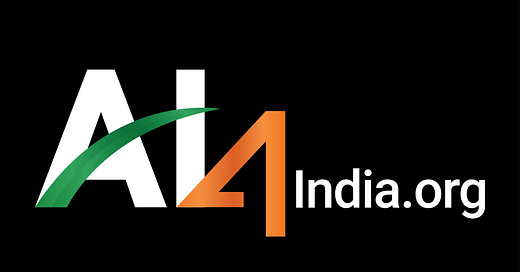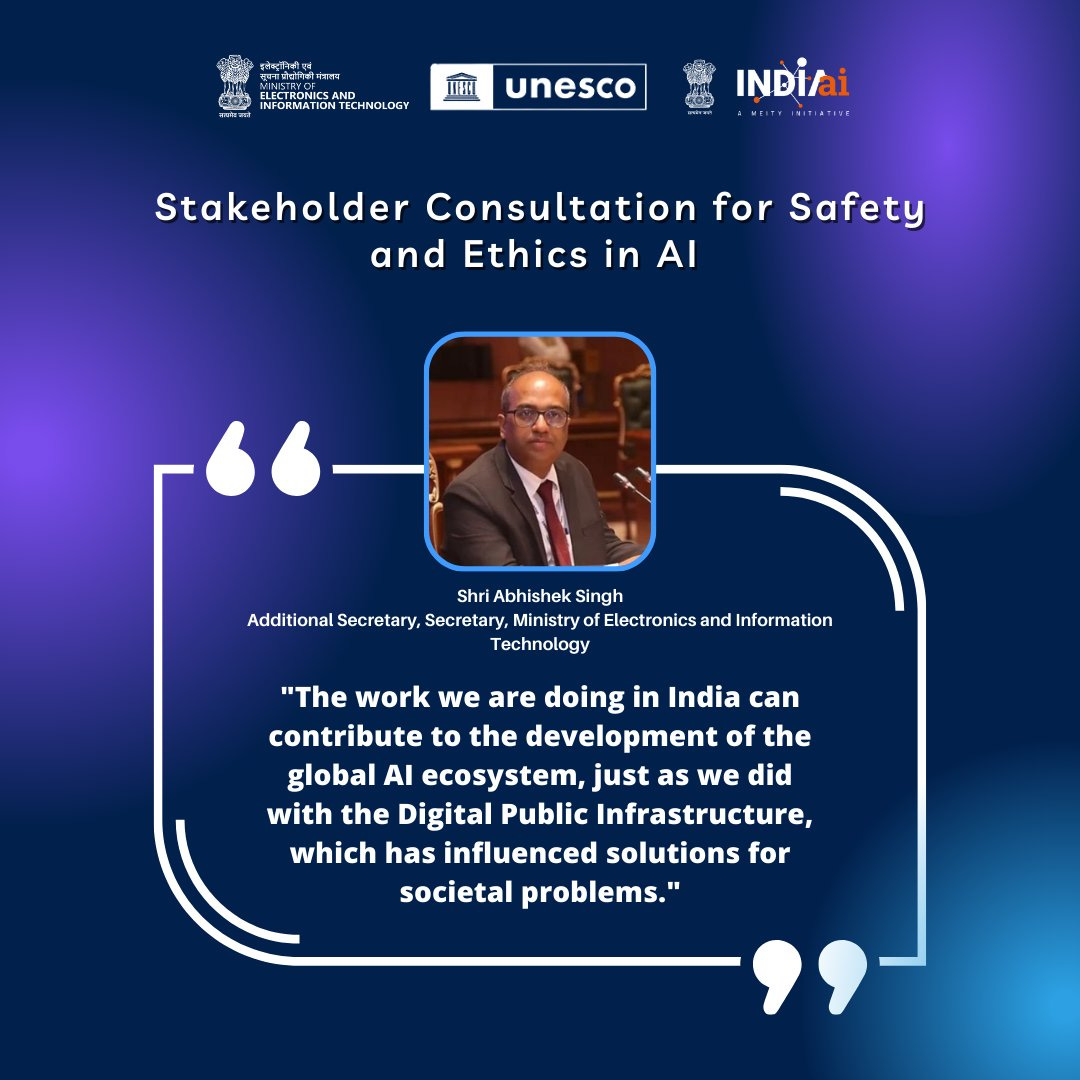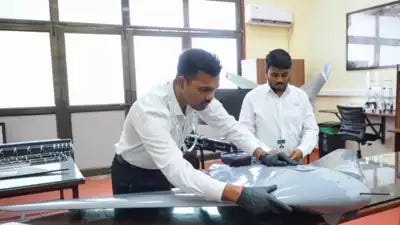Towards Responsible AI: India’s Ethical Standards and Technological Leap
The AI4India Weekly #27
As we continue to witness rapid developments in AI, this edition highlights significant government initiatives, breakthroughs in defense technology, and cutting-edge innovations in sectors like healthcare, automotive, and surveillance. We begin with MeitY’s efforts to craft a Voluntary Ethics Code for AI firms, aiming to ensure responsible AI deployment, followed by insights into Telangana’s strategic push for AI adoption in life sciences. We also feature groundbreaking work such as IIT Kanpur's AI-enabled Kamikaze drone and advancements in connected cars, all setting the stage for India’s role as a global AI leader. Additionally, we explore important discussions on AI ethics, the challenges of AI watermarking, and data privacy issues. Join us in exploring these developments as we continue to build a robust and inclusive AI ecosystem for India’s future.
MeitY's Voluntary Ethics Code for AI Firms: A Step Toward Responsible AI Deployment
The Ministry of Electronics and Information Technology (MeitY) is working on crafting voluntary ethical guidelines for artificial intelligence (AI) firms, particularly those developing large language models (LLMs) and using AI for machine learning training. These guidelines, expected to be released in early 2025, aim to establish responsible practices for AI development and deployment, focusing on preventing misuse and ensuring fairness. While formal legislation on AI remains a work in progress, MeitY is engaging with stakeholders to align the industry on a common set of principles for the ethical use of AI technologies.
The proposed guidelines will include key areas such as training, deployment, and distribution of AI models, alongside procedures for addressing potential risks. This initiative draws inspiration from global codes of conduct, like the G7’s 11-point framework, but will be tailored to India’s unique AI ecosystem. Through these guidelines, MeitY hopes to ensure that AI innovation in India aligns with global standards of safety and ethics, fostering trust in emerging AI technologies.
Data Privacy and Anti-Competitive Practices: A Wake-Up Call for User Rights
The recent ruling by the Competition Commission of India (CCI) imposing a penalty of Rs. 213.14 crore on Meta underscores the growing importance of data privacy and user autonomy in today’s digital world. The fine was levied due to WhatsApp’s 2021 privacy policy update, which compelled users to accept expanded data-sharing terms with Meta companies, without the option to opt out. This anti-competitive practice not only violated user trust but also led to unfair data collection, highlighting the need for stronger protections around data privacy and transparent policies. As digital platforms expand, ensuring that users have control over their personal information and are not coerced into sharing it is crucial for safeguarding privacy and promoting fair competition.
In parallel, the ongoing legal challenges against AI companies, like the lawsuit filed by ANI against OpenAI for unauthorized use of copyrighted content, further emphasizes the need for clear and enforceable data privacy and copyright laws in the AI space. As AI systems rely on vast amounts of publicly available data, questions around consent, data usage, and the risk of spreading misinformation remain pressing issues. This scenario serves as a critical reminder that data privacy is not just about protecting personal information but also about ensuring the responsible use of data in the digital ecosystem.
Read More
Telangana's AI Push in Life-sciences and Healthcare Gains Momentum
The Telangana government is set to establish an AI advisory council for the life-sciences sector by January 2025, as part of its nine-member Telangana AI Advisory Council announced during the Telangana Global AI Summit in September. This lifesciences-focused council, comprising industry leaders, aims to accelerate AI adoption across life-sciences companies in Telangana. Inaugurating the 'AI in Healthcare Summit – Road to BioAsia 2025,' Telangana Industries & IT Minister D. Sridhar Babu highlighted initiatives to strengthen the AI ecosystem, including a new training program on AI and ML for lifesciences and plans for an AI-focused university.
A key milestone was the formation of a lifesciences GCC consortium, comprising 40 global capability centers (GCCs) in Telangana. The consortium has created sub-groups to address talent development, operational efficiency, and supply chain ecosystems, aiming to enhance collaboration and build a strong talent pipeline. Minister Babu emphasized the state's commitment to AI growth, unveiling reports on AI's transformative role in pharma R&D and cyber resilience in healthcare. With plans for an AI city and a robust policy framework inspired by global best practices, Telangana is solidifying its position as a global AI powerhouse in healthcare and beyond.
India’s Leap into 5G-Enabled Smart Cars by 2025
India’s automotive sector is set to enter a transformative phase in 2025, with connected cars featuring 5G Machine-to-Machine (M2M) connectivity, generative AI, and cloud-based technologies becoming a reality. According to Techarc's India Connected Consumer Report 2025, this technological leap will make advanced in-vehicle features like real-time data processing, OTT entertainment, and predictive maintenance standard in vehicles priced above ₹20 lakh. Notably, the industry is skipping 4G adoption entirely, embracing 5G to redefine safety, comfort, and entertainment for drivers and passengers.
This shift underscores India’s growing focus on enhancing vehicle quality and features, a sentiment echoed by 55% of surveyed consumers already familiar with connected car technologies. Leading automakers like MG Motors, Kia Motors, and Tata Motors are spearheading this innovation, with the country poised to lead the global 5G M2M market. With nearly 5 million passenger vehicles produced annually, India is on the brink of a “smartphone era” for cars, blending AI and connectivity to reshape the automotive experience.
IIT Kanpur's AI-Enabled Kamikaze Drone: A Leap in Indigenous Defence Tech
IIT Kanpur has unveiled a cutting-edge Kamikaze drone, marking a milestone in India's defense innovation. This radar-evasive, AI-enabled unmanned aerial vehicle (UAV) can carry a 6 kg warhead with a range of 100 km and an endurance of 50 minutes. Designed by the startup VU Dynamics under the mentorship of IIT Kanpur’s Aerospace Engineering Department, the drone boasts advanced stealth features, autonomous navigation, and a foldable fixed-wing design, making it ideal for strategic military operations in challenging environments.
The drone’s ability to operate without GPS, combined with its high-resolution camera for real-time reconnaissance, provides the armed forces with a tactical advantage. Its indigenous development aligns with the Atmanirbhar Bharat initiative, showcasing India’s growing self-reliance in defense manufacturing. By leveraging advanced AI and stealth technologies, this innovation positions India as a global contender in the rapidly evolving landscape of autonomous military solutions.
Enhancing Surveillance with AI: Yotta's DrishtiCam
Yotta Infrastructure has unveiled DrishtiCam, an AI-powered cloud-based smart surveillance solution, setting a new benchmark in security as a service. Designed to deliver real-time video analytics and high-performance monitoring, DrishtiCam seamlessly integrates with existing CCTV systems. This platform offers actionable insights, including automated alerts for security breaches, anomaly detection, and facial recognition.
As a scalable and cost-effective solution, DrishtiCam is poised to benefit enterprises of all sizes, ensuring robust surveillance with minimal manual intervention. By leveraging AI and the cloud, Yotta continues to drive innovation in India's security landscape, enhancing safety and operational efficiency for organizations across sectors.
Is AI Progress Plateauing? The Orion Controversy
Recent insider reports suggest OpenAI's much-anticipated model, Orion (the rumored GPT-5 prototype), may not represent a significant leap over GPT-4. Employees testing the model noted incremental gains rather than the dramatic improvements seen from GPT-3 to GPT-4. Industry experts, including OpenAI co-founder Ilya Sutskever, have hinted at a plateau in AI's progress, citing diminishing returns from scaling up pre-training. Even benchmarks like the Massive Multitask Language Understanding (MMLU) test show stagnation in performance since early 2023, raising questions about the limits of current deep learning approaches.
This "stalling out" could stem from two challenges: the inability of deep learning to fully replicate human reasoning and the exhaustion of high-quality training data. Companies like OpenAI are exploring alternatives, such as advanced search techniques and "test-time compute," to sustain improvements. However, these approaches are resource-intensive and domain-specific, raising doubts about their scalability. While breakthroughs may slow, AI’s existing capabilities remain transformative, with the potential for decades of innovative applications.
In The News
“Trying to Watermark LLMs is Useless” - Analytics India Mag discusses the challenges and limitations of watermarking large language models (LLMs). Experts argue that implementing effective watermarking in LLMs is not only technically difficult but may ultimately prove ineffective in preventing misuse or protecting intellectual property in AI-generated content. Read more
"Our Mission is to Make AI in India Inclusive" - Google DeepMind Director, Dr. Manish Gupta at HTLS - Dr. Manish Gupta, Director of Google DeepMind, shares insights on the company's vision for making AI inclusive in India. He emphasizes the importance of addressing challenges such as accessibility, diversity, and equitable AI deployment in shaping the future of AI in India. Read more
GMU, IIT Ropar Tie-Up to Boost Crop Yields in India - A new collaboration between George Mason University (GMU) and IIT Ropar aims to leverage AI and technology to improve crop yields in India. This partnership focuses on integrating advanced agricultural techniques with AI to enhance productivity and sustainability in Indian farming. Read more
The Future of Startups Could Be Just One Person & 10,000 GPUs, Says OpenAI's Sam Altman - Sam Altman, CEO of OpenAI, envisions a future where AI-driven startups are no longer constrained by large teams or infrastructure. In a recent discussion, Altman highlighted how a single entrepreneur with access to significant computational resources could potentially disrupt industries. Read more
#DataDaan - Donate for a Digital India
Aligned with the IndiaAI mission and the efforts from MeitY to ensure the availability of AI-usable data across govt, the #DataDaan campaign by AI4India.org is inviting participation from individuals and organizations to contribute valuable data for AI development in India. This initiative aims to gather diverse datasets to enrich the national data repository, supporting innovation across various sectors. We encourage everyone to read the detailed white paper on the campaign - https://bit.ly/DataDaan and fill out the form - http://bit.ly/3XfxD3H to contribute to this transformative effort.
We’ve also created a podcast on #DataDaan using Google’s NotebookLM, which transforms documents into engaging audio conversation. Listen to the podcast below!
This concerted push to make AI work for India highlights how data accessibility can unlock the potential for large-scale socio-economic transformation, driving innovation, and ensuring India’s competitive edge in the AI-driven global economy.
NOTE: The views expressed by the authors are their own. AI4India as a forum does not endorse any comments on specific brands, products, platforms or companies.
Join our AI4India.org forum to be a part of the AI revolution in India by visiting our site now.
Follow us on our X and LinkedIn to receive interesting updates and analysis of AI-related news











